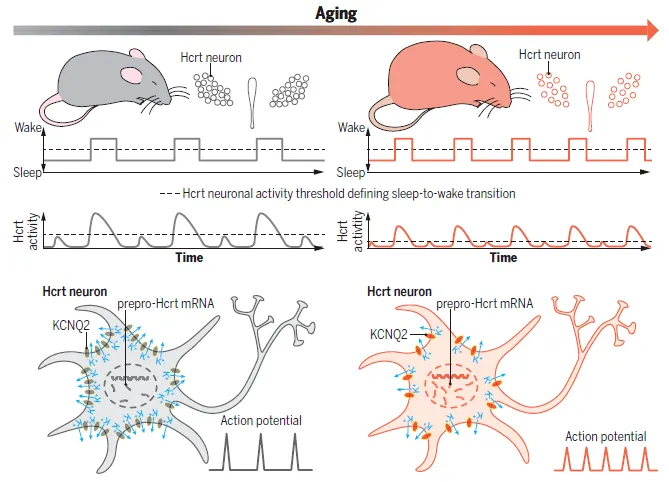Ever wake up from a full night’s sleep and feel like you’ve barely rested?
If you’ve experienced this, you’re not alone. This sensation is known as fragmented sleep, and it’s a growing issue for many people, especially middle-aged and older adults. You might fall asleep, but your rest is interrupted throughout the night, leaving you struggling to get back to sleep. The effects of fragmented sleep go beyond annoyance – they can have severe health consequences.
What is Fragmented Sleep and Why Is It Dangerous?
Fragmented sleep refers to sleep that is constantly broken up, whether it’s waking up multiple times during the night or having difficulty falling back asleep. This disruption can affect brain function, metabolism, and immune health, leading to a range of issues.
The Shocking Health Risks of Fragmented Sleep
Memory Loss and Inflammation
Recent studies have shown that fragmented sleep doesn’t just make you tired; it can accelerate brain aging, damage memory, and increase inflammation levels in the body. Research found that long-term fragmented sleep disrupts metabolism, impairs cognitive function, and leads to heightened systemic inflammation. Animal studies even showed that mice with disrupted sleep had trouble with glucose metabolism, cognitive performance, and memory tasks, which might suggest humans could experience the same risks.

Research screenshots
The 4 Major Health Risks of Fragmented Sleep
Cognitive Decline
Fragmented sleep reduces memory and focus, which can lead to slower reaction times and poor work performance.
Metabolic Disruption
Chronic disrupted sleep increases the likelihood of hypertension, obesity, and other metabolic disorders.
Cardiovascular Risk
Studies link fragmented sleep with a higher chance of cardiovascular diseases, putting heart health at risk.
Cardiovascular disease refers to a range of diseases that affect the heart and blood vessels, including coronary artery disease, heart attacks, and stroke.
Weakened Immune System
With fragmented sleep, the immune system suffers, leading to more frequent infections and chronic illnesses.
The immune system plays a critical role in defending the body against infections and diseases. Fragmented sleep compromises its ability to function properly.

Why Do Older Adults Suffer More from Fragmented Sleep?
Aging brings about changes in the body that affect sleep quality. Older adults often experience lighter and shorter sleep periods. In fact, fragmented sleep is particularly common among seniors.
A 2022 Stanford University study revealed that neurons in the brain, known as “Hcrt neurons“, become overly sensitive and trigger disrupted sleep patterns as we age. Interestingly, even younger mice experienced similar sleep fragmentation when certain genes were suppressed, showing that fragmented sleep may be linked to genetic factors.

Research screenshots
How to Prevent Fragmented Sleep: Tips for Better Sleep
While fragmented sleep can result from genetics and aging, lifestyle choices play a major role. If you’re struggling with sleep interruptions, here are some effective ways to improve your sleep quality:
Maintain a Regular Sleep Schedule
Go to bed and wake up at the same time every day. A consistent sleep-wake cycle helps reduce disruptions.

Avoid Screen Time Before Bed
Blue light from phones and screens messes with melatonin, the hormone responsible for sleep. Limit screen time at least 30 minutes before sleep.
Melatonin is a hormone that regulates sleep-wake cycles and is influenced by light exposure.

Limit Caffeine and Alcohol
Avoid caffeine or alcohol close to bedtime as they disrupt sleep patterns.
Caffeine is a stimulant that can interfere with the ability to fall asleep, and alcohol disrupts the sleep cycle by affecting the brain’s ability to reach deep sleep stages.

Exercise Regularly
Moderate exercise helps regulate sleep cycles and can reduce the chances of fragmented sleep.
Exercise plays an important role in regulating sleep patterns and improving overall health.

Practice Relaxation Techniques
Stress and anxiety can disrupt sleep. Techniques like meditation or deep breathing help calm your mind for better rest.

Conclusion: Take Control of Your Sleep for a Healthier Future
Fragmented sleep may seem like a minor inconvenience, but the consequences are much more serious than you might think. Not only does it impact cognitive function, but it also puts you at risk for conditions like metabolic disorders, cardiovascular diseases, and a weakened immune system. Understanding the dangers of fragmented sleep is essential, especially for older adults. By establishing healthy sleep habits, you can reduce these risks and improve your overall health. Don’t let fragmented sleep take a toll on your health – make changes today to protect your future well-being!



















